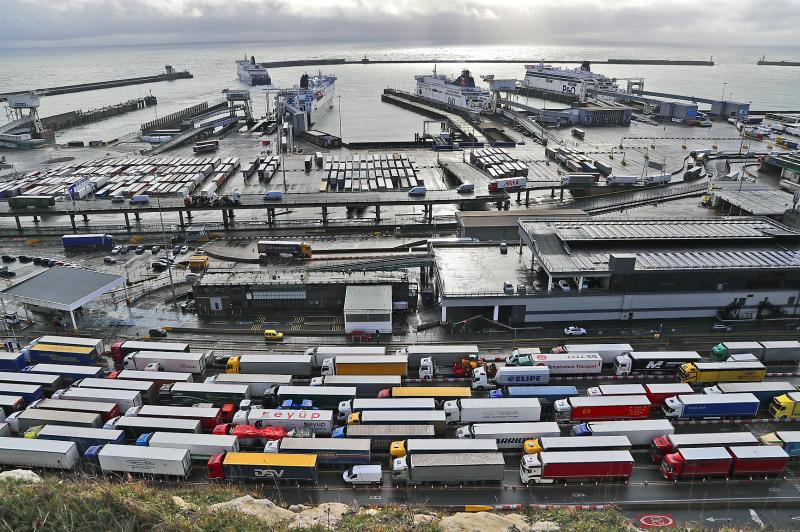New post-Brexit customs rules for goods arriving from the EU to the UK took effect yesterday, and a leading food industry body has warned that the new border controls could lead to food shortages.
Beginning yesterday, importers must make a full customs declaration on goods entering the UK from the EU or other countries. Businesses are no longer allowed to delay completing full import customs declarations for up to 175 days — a measure that was introduced to cope with the disruption of Brexit.
The British Frozen Food Federation this week said that the new restrictions on animal and plant products from the EU could result in major delays at ports in the new year, because some in the supply chain — especially logistics companies on the EU side — might not be prepared for the changes.

Photo: AP
“We are concerned that not enough planning has been done to ensure the new requirements are understood by everyone in the food supply chain,” federation chief executive Richard Harrow said.
“With only days to go before the new rules, we remain concerned that January could be a fraught month for our members,” he said.
The new measures require businesses to complete the correct paperwork at least four hours before goods can arrive at UK borders, or they risk being turned back at the border. Animal and plant-based products must also have statement of origin certificates.
While drivers must declare their goods and origin certificates, checks are expected to be minimal until the rules ramp up in July, when much stricter checks are expected to come into force.
The UK imports five times the amount of food it exports to the EU.
The Cold Chain Federation (CCF) said specialty food imports could face the same 70 percent decline that affected exports of food by small businesses last year, after Britain quit the EU single market and customs union.
“The big casualty of these trade barriers is the business that needs to import small and frequent quantities across borders — a palette load of specialty cheeses or boxes of onion powder. This is the sort of trade that is going to suffer,” CCF chief executive Shane Brennan said.
Business groups have called on the British government to soften its stance in negotiations with the EU to prevent a collapse in trade with the 27-member bloc.
However, while ministers have agreed to extend the deadline for veterinary checks on food crossing the border, there has been little progress on cutting red tape.
Mike Cherry, the chair of the Federation of Small Businesses, said a survey in the autumn showed only one-quarter of firms were prepared for the introduction of full import checks.
“We don’t have any indication that the level of preparedness has improved, especially as the festive trading season has been so disrupted yet again,” he said, adding that one in five small firms that do business internationally had given up selling to clients in the EU since the transition period on exports ended.
The new rules took effect six months after they were originally scheduled because of the effects of the COVID-19 pandemic.

CARROT AND STICK: While unrelenting in its military threats, China attracted nearly 40,000 Taiwanese to over 400 business events last year Nearly 40,000 Taiwanese last year joined industry events in China, such as conferences and trade fairs, supported by the Chinese government, a study showed yesterday, as Beijing ramps up a charm offensive toward Taipei alongside military pressure. China has long taken a carrot-and-stick approach to Taiwan, threatening it with the prospect of military action while reaching out to those it believes are amenable to Beijing’s point of view. Taiwanese security officials are wary of what they see as Beijing’s influence campaigns to sway public opinion after Taipei and Beijing gradually resumed travel links halted by the COVID-19 pandemic, but the scale of

TRADE: A mandatory declaration of origin for manufactured goods bound for the US is to take effect on May 7 to block China from exploiting Taiwan’s trade channels All products manufactured in Taiwan and exported to the US must include a signed declaration of origin starting on May 7, the Bureau of Foreign Trade announced yesterday. US President Donald Trump on April 2 imposed a 32 percent tariff on imports from Taiwan, but one week later announced a 90-day pause on its implementation. However, a universal 10 percent tariff was immediately applied to most imports from around the world. On April 12, the Trump administration further exempted computers, smartphones and semiconductors from the new tariffs. In response, President William Lai’s (賴清德) administration has introduced a series of countermeasures to support affected

Pope Francis is be laid to rest on Saturday after lying in state for three days in St Peter’s Basilica, where the faithful are expected to flock to pay their respects to history’s first Latin American pontiff. The cardinals met yesterday in the Vatican’s synod hall to chart the next steps before a conclave begins to choose Francis’ successor, as condolences poured in from around the world. According to current norms, the conclave must begin between May 5 and 10. The cardinals set the funeral for Saturday at 10am in St Peter’s Square, to be celebrated by the dean of the College

CROSS-STRAIT: The vast majority of Taiwanese support maintaining the ‘status quo,’ while concern is rising about Beijing’s influence operations More than eight out of 10 Taiwanese reject Beijing’s “one country, two systems” framework for cross-strait relations, according to a survey released by the Mainland Affairs Council (MAC) on Thursday. The MAC’s latest quarterly survey found that 84.4 percent of respondents opposed Beijing’s “one country, two systems” formula for handling cross-strait relations — a figure consistent with past polling. Over the past three years, opposition to the framework has remained high, ranging from a low of 83.6 percent in April 2023 to a peak of 89.6 percent in April last year. In the most recent poll, 82.5 percent also rejected China’s